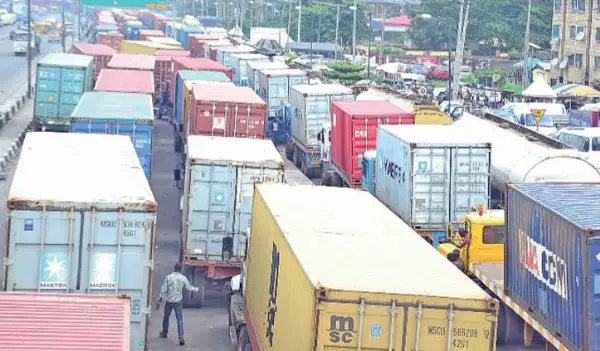
.as Sanwo-Olu calls for greater attention to blue economy
The Senate and Lagos State Government have expressed the need for concerted efforts to end the perennial, interactable traffic gridlock in Apapa and environs of the state.
This came as the State Governor, Babajide Sanwo-Olu, called on the executive and legislature to develop the blue economy in Nigeria by paying greater attention to the sector.
The move for joint efforts in tackling Apapa gridlock was expressed during a courtesy call by the Senate Committee on Marine Transport to Governor Sanwo-Olu at the Lagos House, Marina.
Leading the Senate Committee on Marine Transport to Lagos, was the Chairman of the Committee and former Deputy Speaker of the Lagos State House of Assembly, Senator Wasiu Eshinlokun-Sanni.
Eshinlokun-Sanni, said Lagos is critical to the blue economy, noting that the committee was on a visit to Lagos State because 70 per cent of the activities in the sector take place in Lagos.
He said some of the challenges to the growth and development of the blue economy in Nigeria like non state actors, illegal collectors and ocean surge issues should be addressed immediately.
He urged Governor Sanwo-Olu to fulfill his promise to complete the automated trailer call log system, also known as Call-Up System to ease traffic in the port access environs.
Eshinlokun-Sanni, also called on the governor to address the problem of ocean surges in some of the coastal communities in the Lekki-Ajah corridor.
Responding to the requests of the Senate Committee on Marine Transport, Sanwo-Olu said Lagos being the former federal capital with huge aquatic resources, had the burden of providing home to the majority of the maritime agencies under the purview of the committee.
The governor described the visit of the Senate Committee members to Lagos State for oversight functions as “apt and strategic.”
The governor said the committee’s responsibility was also key to national development.
While pledging his support for the work of the committee, Sanwo-Olu appealed to the federal government to help the state in building more trailer parks to complement the state government’s efforts in tackling the menace of Apapa gridlock.
The governor stressed that all hands must be on deck to aggressively reduce bottlenecks for businesses to thrive in Lagos State, especially in the blue economy sector to increase revenue for the government and to create wealth for individuals.
Sanwo-Olu urged them to make adequate recommendations and suggestions to the larger body of the Red Chamber, National Assembly, on how to move the country forward through the blue economy.
He said: “First is to thank Mr. President (Bola Tinubu) for creating a new ministry called the Ministry of Marine and Blue Economy and the National Assembly has taken the right direction by setting up a proper committee to do oversight function in this very important national assignment.
“We know how the blue economy is transforming the indices of economic development and both the executive and legislature need to support this area such that our economic activities can better be developed, supervised and monitored.
“We need to aggressively reduce bottlenecks of businesses all around facilities and Lagos so that businesses can thrive; they can do well, generate desired revenue to keep people in employment, pay their taxes and create wealth for themselves, families and the nation in general.
“Lagos is happy that there is a whole team that is looking at the blue economy sector and we believe that when we work together, not only the sector will benefit but the entire economy itself will benefit tremendously from all the engagements.”
Sanwo-Olu, also commended President Bola Tinubu led administration for giving prompt attention to all the bridges that lead to various ports in Lagos State.
The governor, therefore, called for efforts to reduce bottlenecks in doing business
Meanwhile, the Senate Committee continued its oversight visits to maritime agencies in Lagos including the Nigerian Ports Authority, the Nigerian Maritime Administration and Safety Agency, and the Shippers’ Council in the state.


